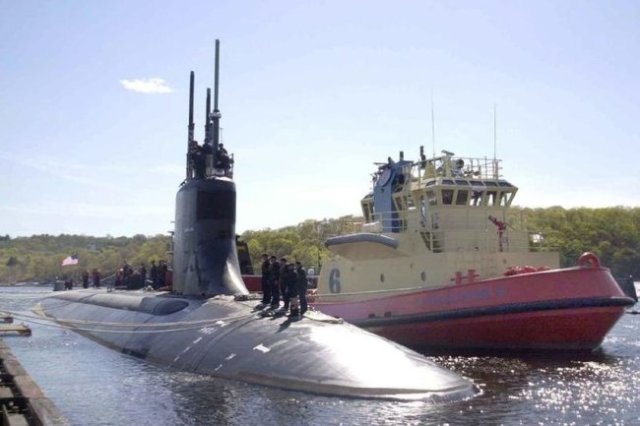Seriously injured in a collision with a seamount in the South China Sea, the nuclear submarine of the US Navy Connecticut arrived in San Diego, having overcome 6,200 nautical miles. What it's like to sail on a submarine with an open hull and damaged equipment, The Drive found out.
Officially, the US Navy does not advertise the transition: the disappearance of the Connecticut from the harbor of Guam was noticed by satellite images, the arrival of the ship in California became known thanks to a frame from a port surveillance camera. Nevertheless, veteran of the submarine forces Aaron Amik told the publication how it could be.
- I believe they were sailing on the surface, accompanied by at least one auxiliary vessel with an average speed of 10 knots. Most likely, the journey was exhausting for the crew, like a nightmare. The submarine is rocking violently on the surface, this would cause an attack of seasickness in susceptible people. With strong excitement, there are problems with moving around the compartments and even sleeping. The bunks on the submarines have towel racks - I had to hold on to it with my hand in a storm so as not to be thrown onto the deck," Amik said.
Lack of sleep and constant fatigue are bad companions for officers and sailors. Most likely, the watch schedule has been revised to meet new realities.
- During the surface crossing, the watches change. Let's say you don't need a diving officer. Surely the acoustic watches were shortened - why are they if the main sonar antenna is broken? However, it is not the only one for submarines of the Seawolf type - there are sonars on the sides. But the number of observers for the condition of the ship has increased - especially in the bow, which was damaged in the collision.
Especially hard during such a transition should be the top watchman. He is standing in an open wheelhouse, he may fall overboard, and the weather can create a lot of problems for him: from heat stroke to hypothermia. In these cases, at least one officer is on duty on the bridge together with the watchman, and in difficult situations - a signalman for operational negotiations with the compartments.
- Food in such a situation is scarce. If the cooks cannot use the grill, the usual cold cuts are served: sliced slices of meat, cheese and bread. This is a very difficult and risky journey, like a nightmare. It's good that it ended well.
Anton Valagin

